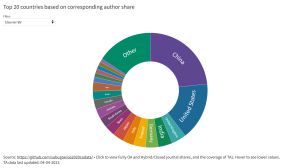Data on the Openness of Scholarly Articles from the Max Planck Digital Library

According to the ESAC initiative at Max Planck Digital Library, there is significant market concentration in academic publishing, with just a handful of publishers accounting for the majority of the scholarly articles published globally. ESAC supplies current data on market shares, transformative agreements and a comparison between countries regarding the openness of scholarly articles.


